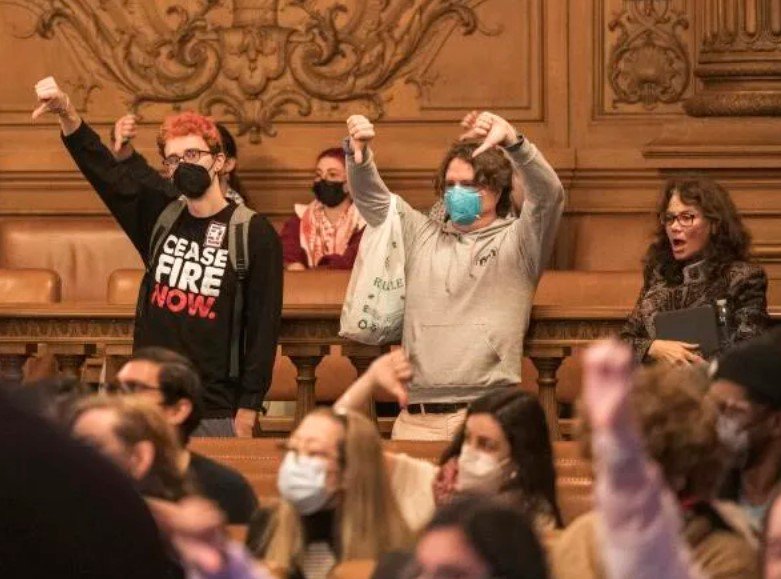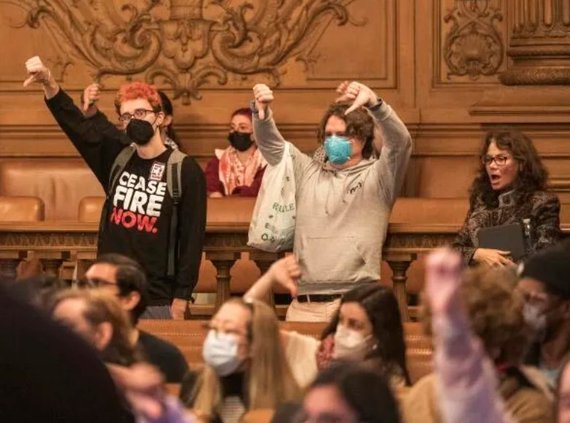It’s always nice to know that a city has its own house in order to the point that they can dabble in the business of countries, states, or even other cities.
Why else would San Francisco that has trash on its streets that could be stacked up halfway to the stars devote energy to the Board of Supervisors stepping into the Hamas-Israel war controversy by adopting a resolution calling for a ceasefire in the Gaza Strip?
The 8-3 vote Tuesday was just the latest in a long history of the city-county channeling a city-nation — think Vatican City — by entering international frays.
There is really no harm done except perhaps making sure elected leaders can do their bit to help drive a wedge between city residents in areas that they have no control.
And while the conceit of some San Francisco leaders is the assumption that 90 percent or so of its residents are in lockstep politically, the 8-3 vote shows otherwise.
Much ado was made about San Francisco joining other cities calling for a ceasefire, but there is a canary in the coal mine people aren’t seeing.
While 70 percent of a board’s vote in any other city would be viewed as an overwhelming majority, it represents a backslide in what was at one time perceived to the most liberal major city on the West Coast.
Arguably, Seattle and Portland passed San Francisco in that category several SF 49ers Super Bowl titles ago.
Places like Berkeley and Santa Cruz are in another dimension when it comes to making national and world issues city-centric.
The problem with taking the old adage of “all politics are local” to the extreme to include a war on the other side of the world is the ripple effect.
Elected leaders conducting pointless town square debates passing toothless resolutions sooner or later will poison the common goodwill pool for residents.
Tuesday’s vote demonstrated San Francisco is not of one political outlook.
After years of everything being cast in stark blue and rigid red, issues are now surfacing that show there are indeed serious differences within blue hues as well as red hues.
Given those reading this likely have no direct stake in San Francisco’s future, we clearly can’t lecture those that do about passing toothless resolutions at the city-county level that aren’t worth the bytes they are impressed upon.
But if you’re someone who wants to see San Francisco shine once again to serve as the heart of Northern California instead of seeing San Jose continually chip away at its status, you’d hope they’d devote more energy to problems within their city limits.
That said, San Francisco gets a bad rap on the danger meter if you judge cities by the most heinous violent acts committed — murder.
San Francisco had 55 murders in 2022.
Compare that to a city of similar size such as Indianapolis that had 226 murders in 2022, Jacksonville in the Sunshine State had 159 murders in 2022, and Columbus came in at 140 murders in 2022. Both have roughly the same number of residents as San Francisco.
Stockton, a city roughly one third the size, has almost as many murders in 2022 with 48.
Given the razzing people in places such as the Midwest like to give California, and Golden State cities such as San Francisco, it would have made more sense to pass a resolution calling for a ceasefire in Indianapolis.
That way, San Francisco could get at least some good PR by the attention that would attract given they have roughly the same population of Indianapolis but just a quarter of the murders.
Or San Francisco could ponder another resolution and call for a moratorium on illegal drug use in their city.
Rest assured, before the current Hamas-Israel war started there were more drug overdose deaths in all of San Francisco than there were likely in the Gaza Strip.
At the end of November, 752 people died by overdoses in San Francisco.
That surpasses the previous mark of 726 in 2020 with one month to go in the year.
Certainly, the Board of Supervisors would dismiss such a resolution by asserting the obvious — it’s more complicated than that.
As such, it is no different than the ceasefire resolution.
Both, unfortunately, are more complicated than just a wanton destruction of lives.
In the end, perhaps people feel they’ve accomplished something.
But the resolution is hollow just like one would be for Jerusalem or Beirut city governments calling for a moratorium on illegal drug use in San Francisco.
Both would mean absolutely nothing as the fury they are born in signifies nothing.
San Francisco officially as a city can’t alter the course of the Hamas-Israel war but they should be able to change the trajectory of drug abuse, homelessness, and property crimes in their own city.
After all, that’s what they were elected to do.
The bottom line is it accomplishes nothing besides making an empty statement.
And it wastes a lot of time and energy not to mention the potential to squander goodwill among the local populace.
Perhaps the most brazen example of wasting political capital, happened during an equally pointless political exercise in the City of Davis more than a decade ago.
The city council had spent contentious hours debating whether to declare Davis a nuclear free zone.
It had absolutely no teeth, of course. If the federal government wanted to transport nuclear material through Davis on Union Pacific tracks or Interstate 80, there was nothing Davis could do to stop it.
The council, split 3-2, then proceeded to discuss where the city should erect signs declaring to the world they were a nuclear free zone.
In a bid to inject levity into a tense situation, the city manager suggested perhaps the sign should go on the roof of city hall facing skyward given if someone was going to drop a bomb that would be the direction it would come from.
The council wasn’t amused.
But it was the perfect zinger to underscore the tendency of elected leadership in some cities to interject themselves into national and world politics when they have plenty of issues to be tackled in their own city.
In the end, it would be more effective at changing the lot of big cities like San Francisco being overrun by those fleeing violence in countries where drugs are king, to pass a resolution calling for a ceasefire in the drug cartel wars as opposed to a ceasefire in the Gaza Strip.
Or, better yet, actually do something about it.
This column is he opinion of editor, Dennis Wyatt, and does not necessarily represent the opinions of The Bulletin or 209 Multimedia. He can be reached at dwyatt@mantecabulletin.com









